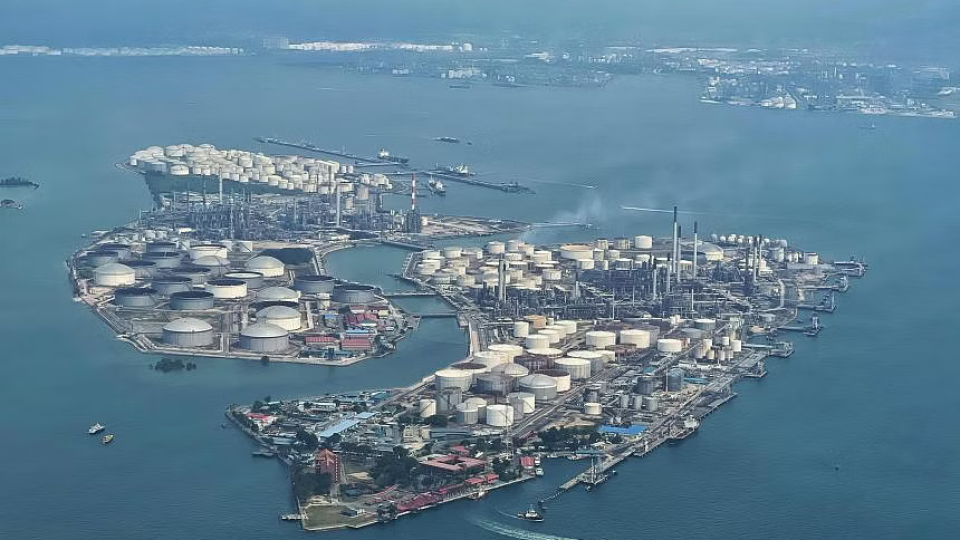May 9, 2024
SINGAPORE – Oil giant Shell has agreed to sell its energy and chemicals park on Singapore’s Pulau Bukom and Jurong Island to CAPGC, a joint venture comprising Indonesia’s Chandra Asri Capital and global commodities trader Glencore.
The sale of Shell’s refining facilities to CAPGC, including Singapore’s first oil refinery built in 1961, comes after the London-listed company placed the assets under a strategic review in 2023 to boost its overall profitability and lower its carbon footprint worldwide.
The transaction, subject to regulatory approval, is expected to be completed by the end of 2024.
All employees “providing dedicated support” to the Shell Energy and Chemicals Park Singapore will retain their employment with CAPGC, Shell said on May 8.
The Economic Development Board (EDB) welcomed the agreement between Shell and CAPGC, and the continued employment that CAPGC will provide to the local workforce.
The value of the deal was not announced by Shell, but Bloomberg News on May 3 said the deal could be worth US$1 billion (S$1.36 billion).
“This agreement marks a significant step in Shell’s ongoing efforts to high-grade our chemicals and products business, and is a testament to our commitment to deliver more value with less emissions, as outlined at our Capital Markets Day last year,” said Mr Huibert Vigeveno, Shell’s director for its downstream, renewable and energy solutions business.
“We are proud of our history on Bukom and Jurong Island and our contributions to the economic growth of Singapore in this sector in the past decades,” he added in a statement.
Mr Vigeveno said that despite the sale of its refining assets, the company will remain committed to its regional hub for marketing and trading businesses in Singapore.
“As Singapore continues to decarbonise, Shell looks forward to a continued partnership with the country and with our customers in the region.”
The assets being sold by Shell include the 237,000 barrels-per-day refinery and a 1.1 million tonnes-a-year ethylene cracker on Pulau Bukom.
Meanwhile, the plants on Jurong Island – spread over more than 60ha – manufacture chemicals such as ethylene oxide, ethoxylates, styrene monomer and propylene oxide.
The plants together represented Shell’s largest petrochemical production and export centre in the Asia-Pacific region.
For Glencore – a global commodities trading giant headquartered in Switzerland – the purchase of Shell’s assets would expand its presence in Singapore.
It already counts the Republic as one of its three main oil marketing hubs. The other two are London and New York.
Singapore will now be the only other country where Glencore has physical oil refining assets besides South Africa. Glencore owns a 100,000-barrel-per-day refinery in Cape Town and a lubricants plant in Durban.
For Chandra Asri, however, the purchase is a big move, giving the Indonesian chemicals and infrastructure company a foothold in one of the world’s top oil refining and trading centres.
The company currently operates Indonesia’s sole naphtha cracker, which can produce 900,000 tonnes of ethylene and 490,000 tonnes of propylene annually – basic raw materials that are further processed at the complex into other petrochemicals.
Shell’s plants in Singapore would provide Chandra Asri with naphtha feedstock for its cracker and allow the company to integrate its petrochemical production with refining, which could improve its efficiency and reduce costs.
Singapore’s proximity to the Strait of Malacca and the South China Sea, its robust intercontinental trading links and access to developing markets – where demand for fuels, lubricants and petrochemicals will continue to grow for decades to come – will keep the country’s status as a key oil and gas trading and refining hub intact.
But the buyers of the Shell facilities would also face competition from an increasing flow of petrochemicals from new plants in China.
EDB’s executive vice-president Lim Wey-Len said: “EDB will work with the companies to ensure continuity of operations and a smooth transition for employees at the Energy and Chemicals Park.”
He said Singapore’s energy and chemicals sector remains robust and will stay on the path of decarbonisation.
“EDB is committed to developing a sustainable and competitive sector with global and local players in Singapore. We continue to seek like-minded partners to pursue innovative solutions to realise our vision for Sustainable Jurong Island and achieve Singapore’s net-zero goals,” he said, in an e-mail response to The Straits Times.
Mr Mohammad Hasrul Passarebu, general secretary of Singapore Shell Employees’ Union, said the union’s key leaders were informed of the sale agreement in advance.
“We are working closely together to ensure that our employees will receive continued employment with the same terms and conditions. The labour-management relationship continues to be strong and collaborative, ensuring a stable and supportive environment for all affected employees,” he told The Straits Times.


